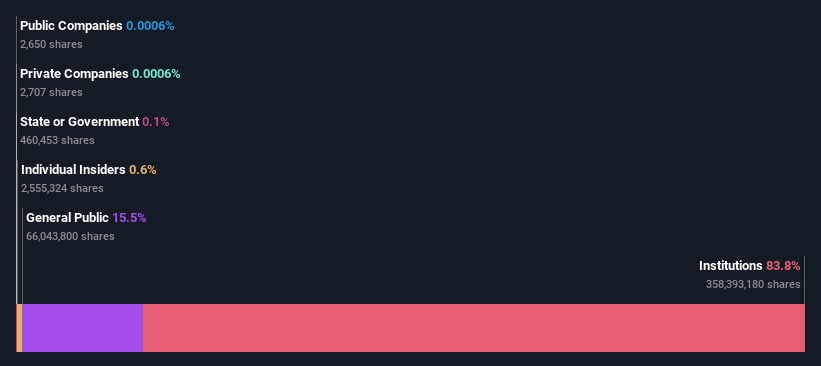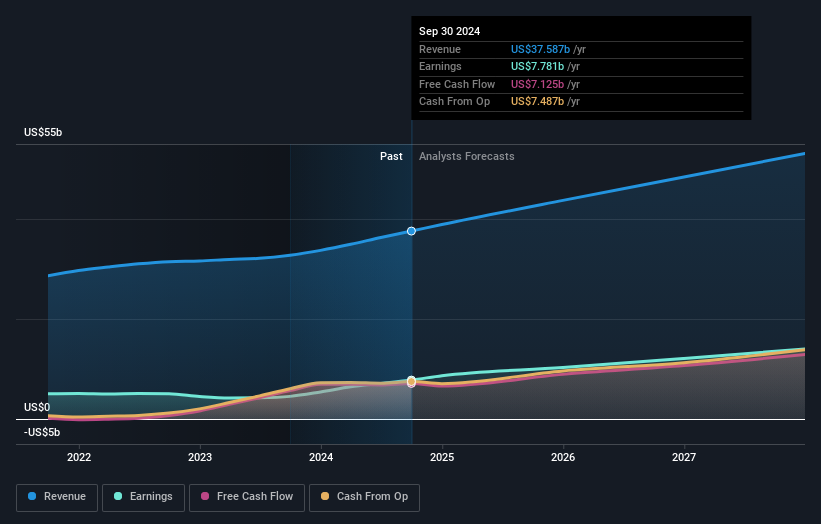- United States
- /
- Entertainment
- /
- NasdaqGS:NFLX
Institutional investors in Netflix, Inc. (NASDAQ:NFLX) lost 4.9% last week but have reaped the benefits of longer-term growth

Key Insights
- Given the large stake in the stock by institutions, Netflix's stock price might be vulnerable to their trading decisions
- A total of 21 investors have a majority stake in the company with 50% ownership
- Using data from analyst forecasts alongside ownership research, one can better assess the future performance of a company
To get a sense of who is truly in control of Netflix, Inc. (NASDAQ:NFLX), it is important to understand the ownership structure of the business. And the group that holds the biggest piece of the pie are institutions with 84% ownership. Put another way, the group faces the maximum upside potential (or downside risk).
Institutional investors was the group most impacted after the company's market cap fell to US$358b last week. Still, the 70% one-year gains may have helped mitigate their overall losses. But they would probably be wary of future losses.
Let's take a closer look to see what the different types of shareholders can tell us about Netflix.
See our latest analysis for Netflix

What Does The Institutional Ownership Tell Us About Netflix?
Institutions typically measure themselves against a benchmark when reporting to their own investors, so they often become more enthusiastic about a stock once it's included in a major index. We would expect most companies to have some institutions on the register, especially if they are growing.
As you can see, institutional investors have a fair amount of stake in Netflix. This can indicate that the company has a certain degree of credibility in the investment community. However, it is best to be wary of relying on the supposed validation that comes with institutional investors. They too, get it wrong sometimes. If multiple institutions change their view on a stock at the same time, you could see the share price drop fast. It's therefore worth looking at Netflix's earnings history below. Of course, the future is what really matters.

Institutional investors own over 50% of the company, so together than can probably strongly influence board decisions. Hedge funds don't have many shares in Netflix. The Vanguard Group, Inc. is currently the company's largest shareholder with 8.7% of shares outstanding. Meanwhile, the second and third largest shareholders, hold 7.4% and 5.5%, of the shares outstanding, respectively.
Looking at the shareholder registry, we can see that 50% of the ownership is controlled by the top 21 shareholders, meaning that no single shareholder has a majority interest in the ownership.
While studying institutional ownership for a company can add value to your research, it is also a good practice to research analyst recommendations to get a deeper understand of a stock's expected performance. There are plenty of analysts covering the stock, so it might be worth seeing what they are forecasting, too.
Insider Ownership Of Netflix
The definition of company insiders can be subjective and does vary between jurisdictions. Our data reflects individual insiders, capturing board members at the very least. Management ultimately answers to the board. However, it is not uncommon for managers to be executive board members, especially if they are a founder or the CEO.
I generally consider insider ownership to be a good thing. However, on some occasions it makes it more difficult for other shareholders to hold the board accountable for decisions.
Our information suggests that Netflix, Inc. insiders own under 1% of the company. Being so large, we would not expect insiders to own a large proportion of the stock. Collectively, they own US$2.1b of stock. It is good to see board members owning shares, but it might be worth checking if those insiders have been buying.
General Public Ownership
With a 15% ownership, the general public, mostly comprising of individual investors, have some degree of sway over Netflix. This size of ownership, while considerable, may not be enough to change company policy if the decision is not in sync with other large shareholders.
Next Steps:
I find it very interesting to look at who exactly owns a company. But to truly gain insight, we need to consider other information, too.
I like to dive deeper into how a company has performed in the past. You can find historic revenue and earnings in this detailed graph.
Ultimately the future is most important. You can access this free report on analyst forecasts for the company.
NB: Figures in this article are calculated using data from the last twelve months, which refer to the 12-month period ending on the last date of the month the financial statement is dated. This may not be consistent with full year annual report figures.
Valuation is complex, but we're here to simplify it.
Discover if Netflix might be undervalued or overvalued with our detailed analysis, featuring fair value estimates, potential risks, dividends, insider trades, and its financial condition.
Access Free AnalysisHave feedback on this article? Concerned about the content? Get in touch with us directly. Alternatively, email editorial-team (at) simplywallst.com.
This article by Simply Wall St is general in nature. We provide commentary based on historical data and analyst forecasts only using an unbiased methodology and our articles are not intended to be financial advice. It does not constitute a recommendation to buy or sell any stock, and does not take account of your objectives, or your financial situation. We aim to bring you long-term focused analysis driven by fundamental data. Note that our analysis may not factor in the latest price-sensitive company announcements or qualitative material. Simply Wall St has no position in any stocks mentioned.
About NasdaqGS:NFLX
Outstanding track record with excellent balance sheet.

